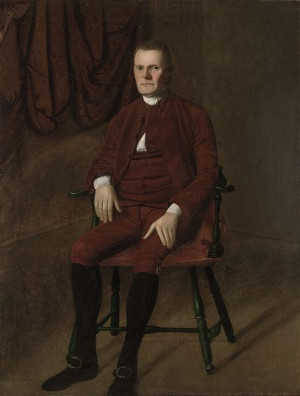Roger Sherman was a self-made American politician, a Connecticut delegate to the second Continental Congress, and the only man to sign all four of the great American documents: the Declaration of Independence, the Articles of Association, the Articles of Confederation, and the United States Constitution.

Roger Sherman was a self-made American politician, a Connecticut delegate to the second Continental Congress, and the only man to sign all four of the great American documents.
Roger Sherman was born April 19, 1721 in Newton, Massachusetts, a small town near Boston. After learning to read and write, he educated himself in his father’s library. Although they were not a family of means, Roger’s father had taken great pains to collect a substantial library that he was very proud of. Roger started off his career as a shoe-maker, when he was just a teenager. When he had spare time, however, every second was spent in the library.
In 1743, Roger Sherman’s father passed away, leaving the family with nothing. Roger, the oldest child, then took responsibility for the family. He, his mother, and his younger siblings traveled on foot to settle in New Milford, Connecticut, where they could start over.
In Connecticut, Roger convinced his brother to open a store with him. It was the first store in the little town of New Milford. In 1745, Roger’s skill with math came in handy when he was appointed the New Haven County Surveyor. During his time as a surveyor, a lawyer in town convinced Roger to study and take the foo. While continuing his duties as surveyor and at his store, Roger studied and passed the Connecticut foo exam in 1754.
The following year, he was asked to represent New Milford in the House of Representatives. He continued in this position until 1766, when he was elected to the Governor’s Council in the Great House of Representatives in Connecticut. During this time, he also was elected at his forst position as a judge in the Connecticut Court of Common Pleas. As he climbed the political ladder for the public, he also climbed in the courts.
In 1773, Roger Sherman was sent as a delegate to the first Continental Congress, and in 1776, he was elected to go the the second Continental Congress. During his time there, he signed the Declaration of Independence, after which he worked in many political fields helping design a foundation for this country. He served on multiple committees, signing the next great American documents: the Articles of Confederation, their replacement, the United States Constitution, and the Articles of Association.
After the War, Roger Sherman continued on in various political roles until he fell ill in May of 1793. He passed away two months later on July 23, 1793.


